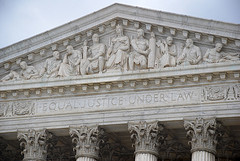Supreme Court Says Reselling Books Bought Overseas Does Not Violate Copyright

(afagen)
The actual case before the Supremes involved a Thai national who attended universities in the U.S. He would buy large quantities of textbooks in Thailand at a low price and then resell them to students in America at a profit, but still less than they would pay elsewhere.
In all, the man made around $100,000 in profit on the sales, but the textbook-publishing folks at John Wiley & Sons said this violated their copyright and filed suit. Lower courts agreed with the publisher, ruling that the Thai entrepreneur owed Wiley $600,000 in damages.
At issue is the doctrine of “first sale,” which essentially holds that the copyright owner has no say in who the purchaser of a copyrighted item resells it to at a later time.
As Ronald Mann explains for SCOTUSblog:
The case turns on a provision of the Copyright Act that permits the owner of a copy that was “lawfully made under this title” to resell the work. The publisher argues that the Thai books, printed in Thailand, were not made “under this title,” and thus that Kirtsaeng cannot lawfully resell them. Kirtsaeng, on the other hands, argues that the books were “lawfully made,” because they were made under a license from Wiley.
And in a 6-3 ruling, the Supremes agreed, with the majority saying that if copyrighted material is lawfully made and sold overseas, the doctrine of “first sale” applies.
It remains to be seen what the long-term impact of this ruling will be, though you can likely expect more businesses attempting to resell items purchased abroad at a lower price than what they go for on the U.S. market.
Want more consumer news? Visit our parent organization, Consumer Reports, for the latest on scams, recalls, and other consumer issues.

